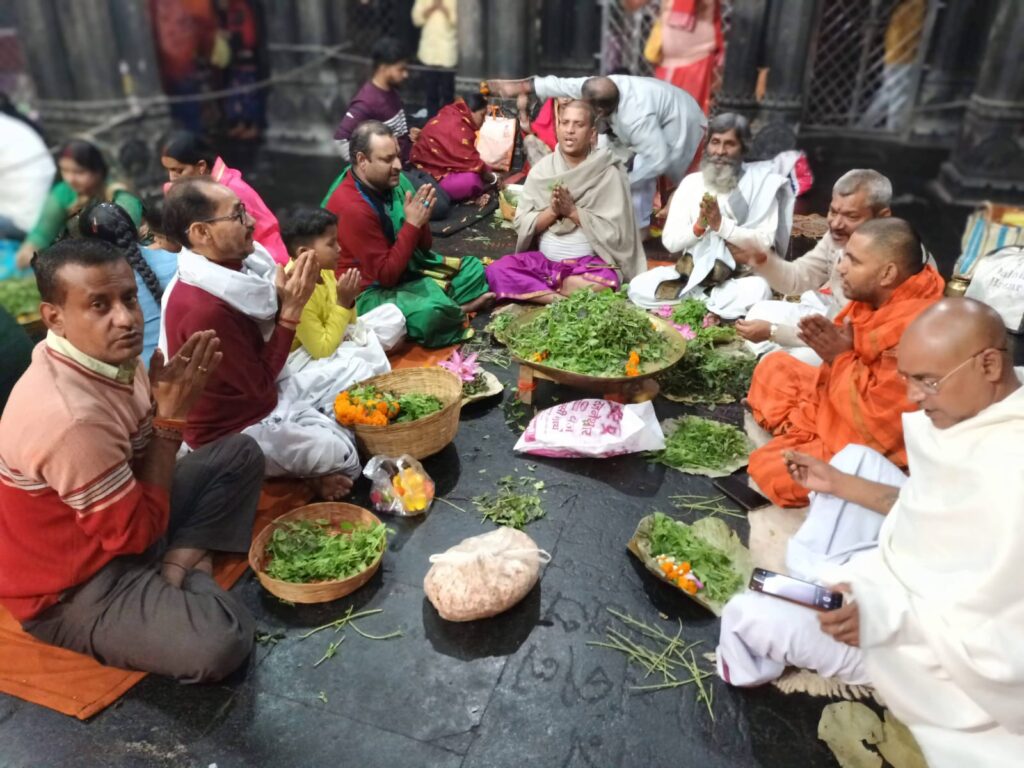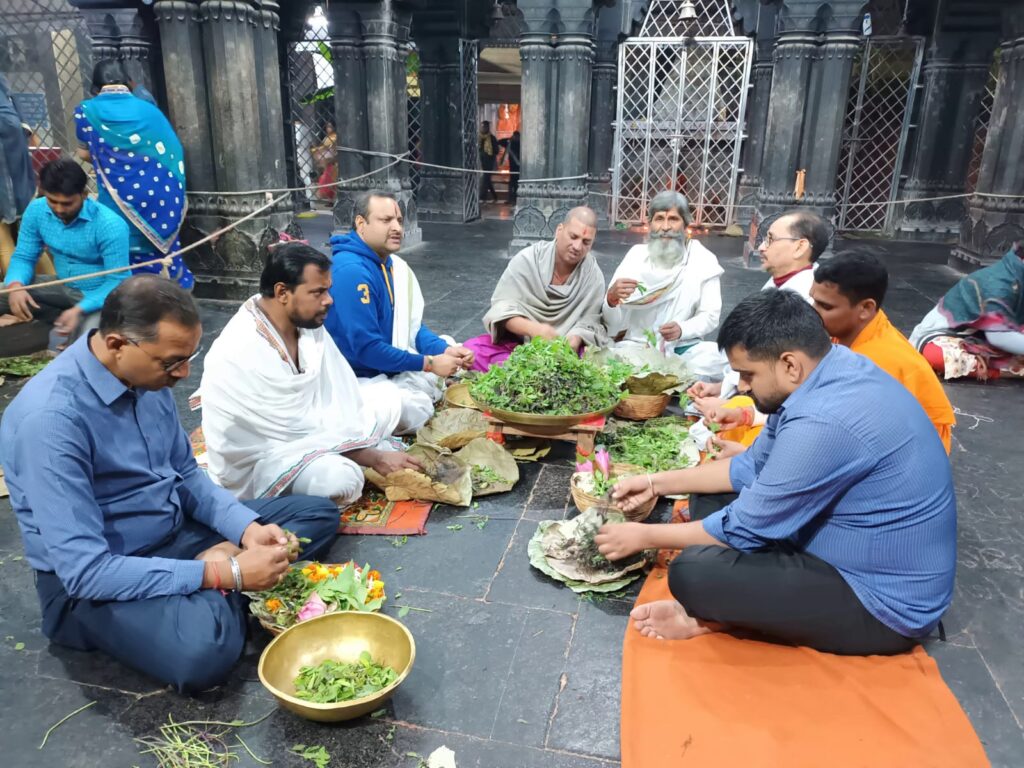Pind Daan In Gaya
This is a sacred Hindu ritual performed to honor deceased ancestors and ensure their well-being in the afterlife. It involves offering a rice ball (Pind) to the departed soul as a symbolic gesture of feeding them.

It involves offering a rice ball (Pind) to the departed soul as a symbolic gesture of feeding them. The ritual is typically performed on the banks of the holy river Ganges in Gaya, India. A qualified priest guides the individual through the process, which includes specific prayers, chants, and offerings. The Pind is prepared with specific ingredients and then immersed in the Ganges. It is believed that this ritual helps liberate the departed soul and ensures their well-being in the afterlife.
About Us - Best Pandit for Pind Daan in Gaya
Carrying on a Family Tradition For generations, the Jhangar family has been dedicated to providing sacred Shradh and Pind Daan services in Gaya. This ancient Hindu tradition, essential for honoring deceased ancestors, has been meticulously carried out by the family for countless years. Today, the mantle of this sacred duty has been passed on to Purohit Alok Lal Jhangar.

Gaya is a sacred city in India, particularly known for its significance in performing Pind Daan rituals. Here are the main reasons why Pind Daan is performed in Gaya:
Spiritual Significance of doing Pind Daan In Gaya
Pind Daan is a sacred Hindu ritual performed to honor and appease deceased ancestors. It's believed to help the departed souls attain liberation from the cycle of birth and death. Gaya, a holy city in India, is particularly revered for this ritual due to its mythological significance and the presence of sacred sites like the Vishnupad Temple and the Falgu River. The ritual typically involves offerings, chants, prayers, and feeding Brahmins, with the ultimate goal of ensuring the well-being and liberation of the ancestors.
Falgu River
The Falgu River plays a significant role in the Hindu ritual of Pind Daan, particularly in the sacred city of Gaya. It's believed that offering water from the Falgu to the ancestors during the ritual helps cleanse their souls and ensures their liberation from the cycle of birth and death. The river's sacredness and association with the city of Gaya make it a particularly auspicious place to perform Pind Daan, and the ritual is often accompanied by a bath in the Falgu to purify oneself.
Ancient Tradition
Pind Daan is a significant Hindu ritual performed to offer food and water to one's deceased ancestors. It is believed that by performing this ritual, one can ensure the peace and well-being of their ancestors in the afterlife and receive their blessings. The ritual typically involves preparing a specific type of food called "pind," which is then offered to the ancestors while chanting mantras. Pind Daan is often performed during specific Hindu festivals or on the anniversary of a loved one's death. It is considered a sacred duty for Hindus to honor their ancestors through this ritual..
Belief in Ancestral Blessings
Ancestral beliefs play a significant role in Hinduism. Hindus believe that the soul, after death, undergoes a cycle of rebirth known as "samsara." The actions performed in a previous life determine the fate of the soul in the next. Therefore, honoring one's ancestors is considered essential to ensure their well-being in the afterlife and to receive their blessings. Hindus believe that ancestors can influence the lives of their descendants. Performing rituals like Pind Daan is believed to appease the ancestors and seek their blessings for prosperity, happiness, and protection. The ancestors are often seen as guardians and protectors of the family. The concept of "pitri paksha," a fortnight dedicated to honoring ancestors, is observed in Hinduism. During this period, Hindus perform various rituals to pay homage to their ancestors and seek their blessings.
Spiritual Liberation
Spiritual liberation, known as "moksha" in Hinduism, is the ultimate goal of human existence. It is the attainment of freedom from the cycle of birth, death, and rebirth (samsara). Moksha is achieved through spiritual practices, self-realization, and devotion to a higher power. It is believed that by attaining moksha, one can merge with the divine and experience eternal bliss. The path to moksha varies depending on different schools of Hinduism, but it generally involves following a code of conduct, practicing meditation, and seeking the guidance of a spiritual teacher.
Our Services
Shradh and Brahmin Bhoj
Shradh is a Hindu ritual performed to honor and appease deceased ancestors. It involves offering food, water, and other items to the ancestors, as well as performing specific rituals and prayers. Brahman Bhoj is a significant part of Shradh, where Brahmins (priests) are invited to a meal as a way to honor the ancestors and seek their blessings. It is believed that feeding Brahmins during Shradh benefits the departed souls and ensures their well-being in the afterlife.
Tripindi Shradh
This specific type of Shradh is performed for individuals who died untimely or under unusual circumstances. It is believed to provide peace to the departed soul and alleviate any negative karmic consequences.
Narayan Bali Pooja
This puja is dedicated to Lord Vishnu and is believed to be effective in removing Pitra Dosha, a negative influence caused by the displeasure of ancestors. It is also believed to help the departed soul attain liberation (moksha).

Pitra Dosha Nivaran
Pitra Dosha is a concept in Vedic astrology that suggests a negative influence from one's ancestors. It is believed that unresolved issues or negative karma from ancestors can affect the lives of their descendants. Pitra Dosha Nivaran refers to the process of rectifying or mitigating this negative influence. It typically involves performing specific rituals or remedies to appease the ancestors and seek their blessings. These remedies can include offering prayers, performing shradh ceremonies, or consulting with an astrologer for personalized guidance.
Varshhik Shradh
Varshik Shradh is an annual ritual performed in Hinduism to honor one's deceased ancestors. It is typically observed on the anniversary of a loved one's death. The ritual involves offering food, water, and prayers to the ancestors, seeking their blessings and ensuring their well-being in the afterlife. Varshik Shradh is considered a sacred duty for Hindus and is often performed by family members or priests.c
Tulsi Archana
Tulsi Archana is a Hindu ritual performed to worship the Tulsi plant, considered sacred in Hinduism. Tulsi, or basil, is believed to have medicinal properties and is associated with the goddess Lakshmi, the goddess of wealth and prosperity. The ritual involves offering water, flowers, and incense to the Tulsi plant, chanting mantras, and circumambulating it. It's believed that worshipping Tulsi brings blessings, prosperity, and spiritual purification.